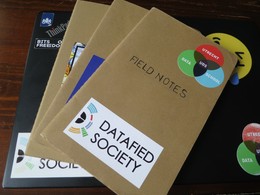Mirko Tobias Schäfer / Assistant Professor
University of Utrecht Department for Media and Culture Studies
Mirko Tobias Schäfer / Assistant Professor
University of Utrecht Department for Media and Culture Studies
While co-teaching Digital Ethics with my colleague Joel Anderson from the philosophy department at Utrecht University, we discussed the distinct research perspectives Utrecht Data School and Datafied Society have developed. In one of these discussions he pointed out that our approach is more "forensic and diagnostic, and hands-on, helping students to appreciate the methods and tools that are being used, and to understand the potential for nefarious uses of these technologies." This really is a key element. We do not only teach the use of data practices but also inquire into the epistemic impact. This also manifests in critically revisiting the tools we use for data analysis. Recognizing the lack of documentation in the popular network analysis software Gephi, our researchers Maranke Wieringa and Daniela van Geenen teamed up with Utrecht University’s Humanities Lab to develop a plug-in for recording the researchers’ actions when developing the network analysis (Wieringa, Van Geenen, Van Es, Nuss 2019).
We are interested in both using and critically reflecting on data practices. This also manifests in our work with external partners, where we mostly join are mostly invited in our capacity as experts in data ethics, and data politics: we do not come in and raise all kind of warning flags. Rather the opposite: with reference to McLuhan, we maintain a suspended judgement in order to capture sufficient data and map the actor networks affecting datafication in the respective organization. Arguing in a patronizing way from a morally superior position would terminate conversations and stifle our ability to intervene. More importantly, we think that due to our focus on tool criticism (Van Es, Wieringa, Schäfer 2018), our understanding of cultural complexity and dynamics of power and counter-power, we can be informative in developing better uses and practices within the very sectors that we are investigating. This becomes evident in the increasing use of our Data Ethics Decision Aid in municipalities, ministries and companies. It also opens doors for direct cooperation in basic research projects: Maranke Wieringa, PhD candidate at Utrecht University’s Datafied Society Research Group, cooperates with government organizations in her research on algorithmic accountability and has access to government initiatives on transparent algorithms, open government, etc. Our research consortium Dataworkplace inquires jointly with municipal and regional government organizations into the transformation of public management through datafication. Here, we simultaneously investigate challenges these organizations face through datafication and develop solutions to address them.
The same is true for our newly revived approach to Datawalks. Our research intern Petra Biro experiments with datawalks as a diagnostic and forensic way to understand how datafication transforms public space and the everyday life of citizens. We also want to explore how tested scholarly methods from anthropology, urban studies, ethnography can inform the development of our own distinct methods that allow us to map the physical space and its phenomenon of datafication with the emerging data layer. Further pursuing this aim, we might even be able to apply the method for participatory actions of residents and the municipality. Again, the inquiry of the dynamics of power and counter-power are visible in this approach. But it also combines applied and basic research and simultaneously develops societal impact.
The richness of this approach lies in our ability to understand the actual practices conducted in societal sectors and utilize these empirical insights for conceptualizing the datafied society. We are in this sense different from other colleagues who due to a lack of extensive insights use limited empirical insights (e.g. drawing from a mere 13 interviews with people from as many as five different stakeholder groups) to support their theoretical musings. What sets us significantly apart here, is the scope of insights that we gather from societal sectors, the mutual knowledge transfer with practitioners and non-academic experts, and the interdisciplinary approach with colleagues from different scholarly backgrounds and mixed teams with a variety of expertise. Our challenge is the translation of our rich field-research experience into reports and papers.
We managed to build a platform (Utrecht Data School and Datafied Society) that allows us to structurally place our research efforts within societal sectors in cooperation with external partners (Schäfer, Van Schie 2019). This has recently led to larger research consortia such as our cooperation with municipal and regional government institutions in the Dataworkplace, and to the cooperation with Public Service Media in our Algorithms & Audiences consortium. But it is truly interwoven in every layer of Utrecht Data School and Datafied Society, from the Practicum for undergraduates, to embedded research assistants paired with external partners, to the joint research projects with external partners, and the many ties our PhD projects have to societal sectors and the actual challenges they address there.
This enables us to situate data collection directly within the field where datafication manifests, and it allows us to consider the actual practices, views, motivations and expectations of the various actors shaping datafication within these societal organizations. It also constitutes opportunities for immediate impact and makes our work relevant. Finally, it provides fantastic career opportunities for our students and team members who want to embark on other adventures.
Date April 2019 Category News

Over the past years we have developed Utrecht Data School as a platform for teaching digital methods and data analysis. Working together with societal partners fundamentally shaped our method and affects our day-to-day work. This post is part of my field notes on developing entrepreneurial research and investigating datafication.